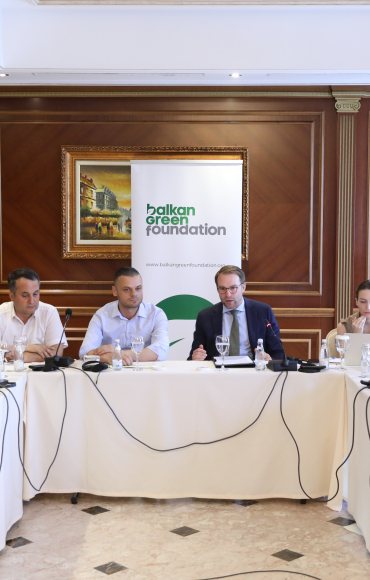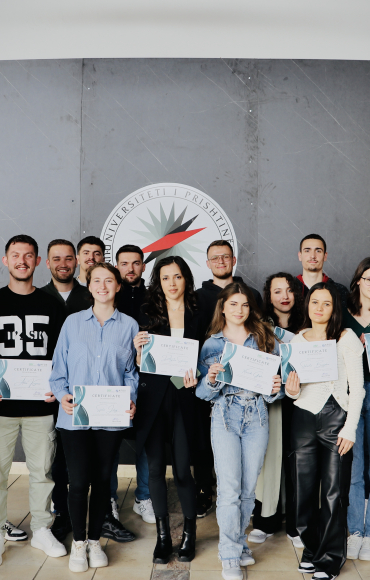10 October 2024
"There is a country in Europe. A country where the sun shines for full 278 days of the year…" this is how the rock band ‘The Animals’ would begin their lyrics if the famous song 'House of the Rising Sun' was written about Kosovo instead of New Orleans.
With 278 sunny days, Kosovo is an ideal place to use the sun for energy production. But, current solar energy, together with wind and hydropower output, makes up only 23.3% of the energy produced in Kosovo, while 77.7% comes from coal-based power plants. However, there are plans to gradually phase out this high number of coal-fired power usage, based on the goals of the Energy Strategy and the actions undertaken as part of the Green Agenda for the Western Balkans, which Kosovo signed in November 2020 at the Sofia Summit.
Kosovo continues to heavily rely on old and polluting coal-fired power plants. According to the Kosovo Energy Strategy, by 2031, the share of renewable resources in Kosovo will reach 35% from 6.3% in 2021. By this, renewable capacities in the electricity sector are expected to increase from current 279 megawatts to 490 megawatts by the end of 2025, while in 2031, the aim is to reach a capacity of 1,600 megawatts. The data of the Energy Regulatory Office (ERO), about the number of authorizations for self-consumption generators, show that in the last seven years only 308 licenses were issued to businesses and individuals, of which 66 licenses were issued in 2023, 117 in 2022, 50 in 2021, 33 in 2020, and so on. In addition, the Green Agenda includes a wide range of initiatives aimed at reducing greenhouse gas emissions and pollution, protecting the environment and biodiversity, etc. All these will be actions that will mitigate the impact on the environment.
Solar energy works through panels consisting of voltaic cells, which convert sunlight directly into electricity. Installing these panels offers many benefits: it is sustainable and renewable since the sun is an inexhaustible energy source. Also, it does not cause air pollution and has minimal environmental impact.
There are big differences in the environmental impact of a kilowatt produced by coal-fired power plants and solar panels. According to Dardan Abazi, researcher at INDEP, "Just for the production of one kilowatt from burning coal with the current power plants in the country, about 900 grams of carbon dioxide are released on average, while to produce one kilowatt from solar energy only 20 grams of carbon dioxide are released." In Kosovo, in the last years, traditional power plants manage to produce more than 900 thousand megawatts and every hour they release more than 800,000 tons of carbon dioxide.
In order to implement the Energy Strategy, the Ministry of Economy has undertaken the initiative to subsidize households and small and medium enterprises to install solar systems for self-consumption. Through the subsidy, this Ministry is supporting initiatives by households and companies in installing solar systems for their energy efficiency and environmental protection.
The Ministry of Economy says that by this initiative "it aims encouraging the saving of electricity by family consumers, small and medium-sized enterprises, supporting households through the increase of Energy Efficiency in residential units and buildings, as well as investments in efficient household appliances." Also, according to the Ministry of Economy, the support of investments in renewable energy systems for self-consumption affects the mitigation of global warming, does not cause pollution, and reduces greenhouse gas emissions.
Solar photovoltaic power plants have started emerging in some parts of the Kosovo Energy Corporation (KEK). The installation of the solar photovoltaic power plant started in 2023 in the former ash dumps near the "Kosova A" Power Plant, with a capacity of up to 100 megawatts. This plant is expected to produce close to 150 gigawatt hours of electricity, reducing approximately 150 tons of carbon dioxide per year. This project by the Steering Committee of the Western Balkans Investment Framework will tenfold increase the installed capacity of the solar system in Kosovo from 0.2% to 2.3%.
One of the biggest projects in the energy field in Kosovo is the "Solar 4Kosovo", which will be used only for heating. This project will install one of the largest solar plants in Europe and the first in the region in terms of capacity, which will use solar energy for the benefit of thermal energy. The solar panels will bring an additional thermal capacity of 50 megawatts to supply heat to twelve thousand new consumers of "Termokos"; in addition to heating new consumers, this project will also affect the reduction of environmental pollution in Pristina since it will avert other heating alternatives that pollute the environment.
According to Dardan Abazi, a researcher at INDEP, "With the greater introduction of generating capacities from renewables, the power plant units will gradually have to be closed, first the units of Kosovo A and later the units of Kosovo B."
Kosovo has a very favorable position regarding the use of solar energy; however, this resource is currently untapped.
According to Zeqir Veselaj, environmental education lecturer at the University of Pristina, "Numerous studies in the last two decades have shown Kosovo's potential for using renewable energy sources, especially solar and wind energy. Not enough has been invested to exploit this potential of solar energy. Studies show that the number of days with sunshine in Kosovo during the year and the solar production capacity are very promising in the decarbonization of the energy sector."
The existing thermal power plants in Kosovo have already passed their lifespan, and as such, during the sensitive periods, such as the winter season while recently even with warm days during the summer, when the use of electricity increases, the citizens of Kosovo and businesses risk lack of 24-hours electricity supply. All this comes from the lack of electricity produced in the country, which comes from high consumption or even frequent breakdowns in these power plants, especially during the winter season. Besides this, coal-based power plants continue to be quite expensive for their consumers, and in particular, they are the main source of environmental degradation in Kosovo, which results in an extremely high cost in human health. According to research published two years ago by the Institute for Social Policy, "Musine Kokalari," 52 people in Kosovo lose their lives prematurely due to exposure to air pollutants, to which coal contributes to a large extent.
For this reason, Kosovo must use energy from renewable sources, both in terms of energy demand, financial terms, and human health and nature.
Using solar energy brings long-term savings to consumers. Although the initial installation may incur costs, it lasts for up to 25 years. According to research by the International Renewable Energy Agency (IRENA), solar energy costs have dropped 82% in the last 10 years. Only for 2018 and 2019, a decrease of 13.1% was noted. The use of renewables also significantly reduces energy bills for long-term periods.
In their answer, one of the companies installing solar panels, "Kit Solar Systems," says that the number of families using solar energy is gradually increasing. This company singles out the impact in terms of the environment and energy saving with the use of solar energy: "Except for the benefits of using solar energy as to the environmental aspect, another benefit is that energy saving and investment in solar panels is long-term investment for more than 25 years. The installation cost for a family with an average annual consumption of over 10,000 kilowatts is around 5,000 euros with an installation capacity of 7 kilowatts peak (kWp — the unit of measurement for the energy obtained from solar energy)."
However, the country is facing some challenges in investing and increasing the use of renewable resources. Publication by Balkan Green Foundation (BGF) on the challenges of solar energy production in Kosovo singles out the lack of simplification and harmonization of permit procedures, the lack of updating existing development plans, the lack of a guide for solar investment areas, the burden of construction permits, and other challenges. However, these challenges are gradually being avoided. Last year, the Ministry of Environment, Spatial Planning, and Infrastructure decided that citizens will no longer require a construction permit to install solar panels for up to seven kilowatts of household consumption. In addition to easing the procedures, with the installation of solar panels, the citizens of Kosovo can also benefit from the subsidy of the Ministry of Economy.
The perspective is bright despite the many challenges that Kosovo has encountered on the way to an energy revolution. With a favorable geographical position and many sunny days, Kosovo has the potential to become a leader in using renewable energy in the region. The measures recently taken to ease procedures and encourage investments in solar energy are the beginning of a transformation that will bring citizens great economic, environmental, and health benefits.
So, let's look to the future with optimism, seeing the sun as a source of light and the key to a greener and more sustainable future for Kosovo.
Author: Agron Canolli


